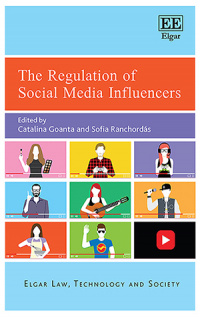the regulation of social media influencers

New book release: Catalina Goanta & Sofia Ranchordàs
This book offers an exploratory analysis of this phenomenon and delves into the regulatory challenges resulting from the activity of social media influencers. It fills an important gap in the academic literature by providing an interdisciplinary analysis of a phenomenon with growing societal relevance. Given their large audiences, influencers are very effective not only at creating online engagement for the companies that employ their services, but also at manipulating their followers’ opinions and transactional behavior, as the latter do not always distinguish between genuine and sponsored marketing advice. Although advertising regulations include endorsements made on Instagram or Youtube by ‘prosumers’, influencers appear to disregard these regulatory limits and national regulators have experienced difficulties in safeguarding their enforcement. In this context, average social media users are at an ever-greater risk of falling prey to inconspicuous commercial interests. This book introduces interdisciplinary perspectives that bring together insights from media studies, law, communication science and empirical legal studies, dealing with themes such as social media, influencer marketing, free speech, gig work, platform governance, and consumer protection.
The book project has already led to several additional research spin-offs, such as mapping the influencer landscape in certain specific jurisdictions for the International League of Competition Law (LIDC). LIDC is an association focused on the study of competition (antitrust) law, intellectual property law and unfair competition. Every year it issues reports on topics of interests for the academic world and the private sector. This year, one of the reports will tackle the issue of ‘Influencers, native advertising and the use of AI for marketing – how can it be controlled by law?’. The national report for Romania will be prepared by Catalina Goanta and Alexandru Sotropa.
